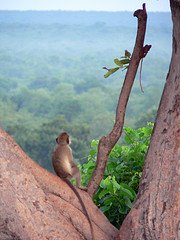Tracking down data on failures in transparency and oversight in biosafety, The Sunshine Project has become acquainted with some of the National Primate Research Centers (and affiliated institutions) as well as others that have been criticized for primate experimentation:
"How big is this enterprise? At just one venue, the Southwest Foundation for Biomedical Research (SFBR) in San Antonio, Tex., there are 6,000 caged chimpanzees, baboons, and other primates, Sunshine reports, whose upkeep alone costs U.S. taxpayers $6-million annually. SFBR genetically engineers monkeys and harbors some of the world's most dangerous viruses such as Ebola and Lassa, authorities state. "
In their 2004 report, Mandate for Failure, TSP named the University of Washington for the most embarrassing moment for biosafety regulators. This dubious distinction came courtesy of its programs for 1918 flu experiments, which took the modified and modest "Texas strain" with genes from the Spanish flu strain (including genes responsible for virulence).
Plans to expose monkeys to 1918 flu at the WaNPRC were dependent upon the retrofitting of labs there, a process which was repeatedly delayed. Progress was apparently too slow for investigators; it seems that the program may now be moved to a Battelle Lab in Ohio. Notably, Battelle is also named in the TSP report for biosafety failures of its own.
Other institutions under the lens for primate experimentation and biosafety failures include the University of California at San Francisco and Wake Forest University.
See the entire piece at opednews.com


0 Comments:
Post a Comment